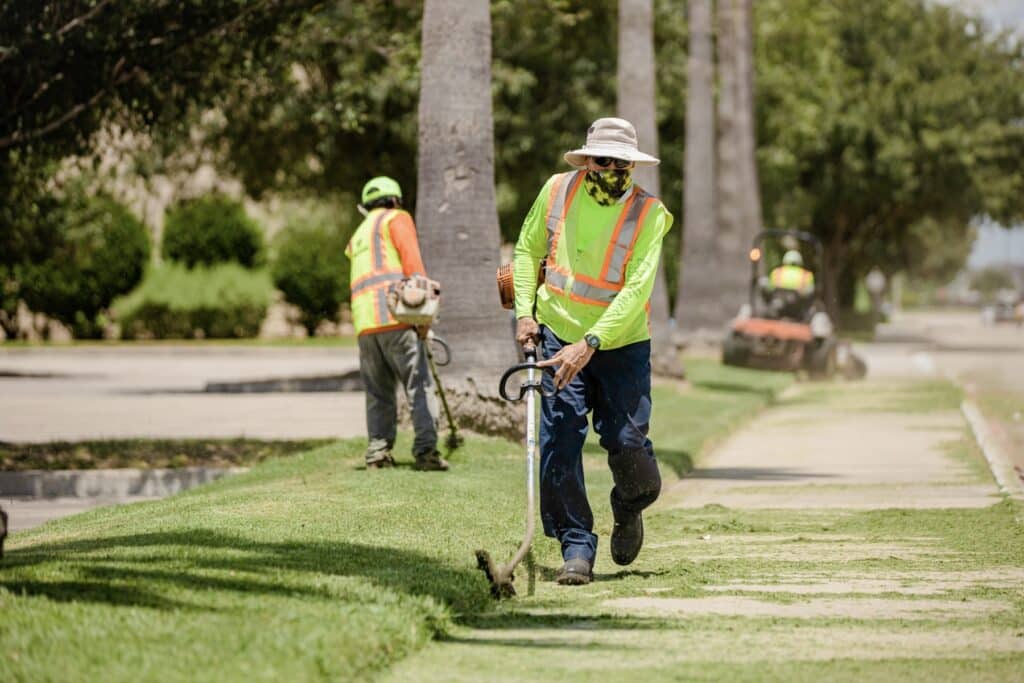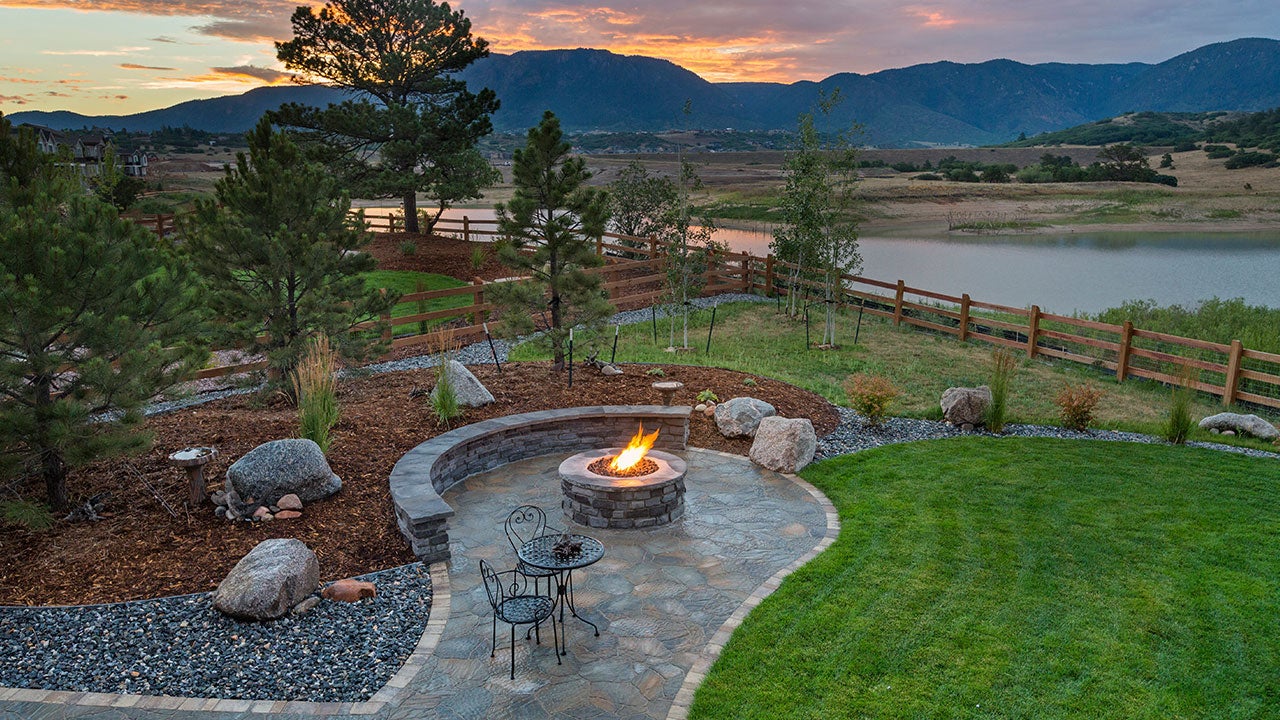Home>Garden Design>Planning Your Garden>How To Get Landscaping Contracts


Planning Your Garden
How To Get Landscaping Contracts
Modified: January 22, 2024
Looking to secure landscaping contracts? Learn how to plan your garden effectively and attract clients with our helpful tips and strategies.
(Many of the links in this article redirect to a specific reviewed product. Your purchase of these products through affiliate links helps to generate commission for Chicagolandgardening.com, at no extra cost. Learn more)
Table of Contents
Introduction
Welcome to the world of landscaping contracts! If you have a passion for creating beautiful outdoor spaces and want to turn it into a profitable business, this article is for you. In this guide, we will walk you through the process of securing landscaping contracts and building a successful career in the industry.
Landscaping contracts are agreements between a landscaping professional or business and a client to provide services such as design, installation, and maintenance of outdoor spaces. These contracts can range from small residential projects to large commercial ventures, depending on the client’s needs.
As a landscaper, securing contracts is essential for your business growth and success. However, finding and winning contracts can be a daunting task, especially in a competitive market. That’s why it’s crucial to have a strategic approach and a solid understanding of the process.
In this guide, we will explore various aspects of obtaining landscaping contracts, including finding potential clients, networking, creating winning proposals, pricing, bidding, negotiation, project management, and building a reputation for winning repeat business.
Whether you are just starting out or looking to expand your existing landscaping business, this article will provide you with the knowledge and insights to navigate the world of landscaping contracts effectively.
So, if you’re ready to take your landscaping career to the next level, let’s dive in and explore the strategies and techniques that will help you secure those coveted landscaping contracts.
Finding Potential Clients
When it comes to finding potential clients for your landscaping business, a proactive approach is key. Here are some effective strategies to help you identify and reach out to potential clients:
- Identify Your Target Market: Determine the specific market segment you want to target. Are you focusing on residential clients, commercial properties, or both? Are you specializing in high-end designs or focusing on budget-friendly landscaping? Knowing your target market will help you tailor your marketing efforts and outreach strategies.
- Local Networking: Attend local community events, trade shows, and networking events to connect with potential clients. Joining local business organizations and associations can provide valuable networking opportunities and help you establish relationships with other professionals in the industry who may refer clients to you.
- Online Platforms: Create a strong online presence by building a professional website and optimizing it for search engines. Utilize social media platforms like Facebook, Instagram, and Houzz to showcase your work, engage with potential clients, and generate leads. Consider listing your business on online directories and review sites to increase visibility.
- Referrals: Word-of-mouth is a powerful marketing tool. Encourage satisfied clients to refer you to their friends, family, and colleagues. Offer incentives, such as discounts on future services, for successful referrals. Additionally, establish relationships with other professionals related to the landscaping industry, such as real estate agents, who can refer clients to you.
- Direct Mail Campaigns: Develop targeted direct mail campaigns to reach potential clients in your area. Consider sending out postcards or brochures showcasing your services and offering special promotions. Personalize your messages to make a lasting impression and increase the chances of acquiring new clients.
- Partnerships: Collaborate with other businesses that complement your services. For example, partner with local nurseries, garden centers, or outdoor furniture retailers to offer joint promotions or cross-promote each other’s services. These partnerships can help you reach a wider audience and generate leads.
Remember, building a strong network and establishing relationships with potential clients is an ongoing process. Consistency, professionalism, and excellent customer service will lay the foundation for lasting client partnerships.
Networking and Building Relationships
Networking and building relationships are crucial for success in the landscaping industry. By establishing strong connections with potential clients, industry professionals, and other relevant stakeholders, you can expand your professional network and increase the chances of securing new contracts. Here are some effective strategies for networking and building relationships:
- Attend Industry Events: Participate in trade shows, conferences, and industry events to connect with fellow landscapers, suppliers, and potential clients. These events provide an excellent opportunity to showcase your work, exchange ideas, and build partnerships.
- Join Professional Organizations: Become a member of landscaping or horticultural associations in your area. These organizations offer networking events, educational resources, and certification programs that can help you establish credibility and expand your professional network.
- Engage in Online Communities: Join online forums, Facebook groups, and LinkedIn groups related to landscaping. Participate in discussions, answer questions, and share your expertise to position yourself as a knowledgeable and supportive professional. This can lead to referrals and collaborations with other industry experts.
- Collaborate with Other Professionals: Build relationships with professionals who complement your services, such as architects, interior designers, and contractors. Connect with them on projects where your expertise aligns, and refer clients to one another. This collaborative approach can help you access a wider client base and establish a reputation for delivering comprehensive solutions.
- Offer Value to Others: Be generous with your knowledge and expertise. Share useful tips, resources, and industry updates through blog posts, social media, or newsletters. By providing value to others, you can establish yourself as a trusted authority and attract potential clients who appreciate your expertise.
- Follow Up and Stay in Touch: After meeting potential clients or industry professionals, be sure to follow up with them. Send a personalized email, make a phone call, or connect on social media to keep the conversation going. Regularly stay in touch with your network by sharing updates on your projects and industry insights.
Remember that building genuine relationships takes time and effort. Be sincere in your interactions, show genuine interest, and prioritize long-term connections over immediate gains. Networking and building relationships can open doors to new opportunities and enhance the growth and success of your landscaping business.
Creating a Winning Proposal
A well-crafted proposal is essential when it comes to securing landscaping contracts. It showcases your expertise, highlights your unique selling points, and convinces potential clients that you are the right choice for the job. Here are some key steps to create a winning proposal:
- Understand the Client’s Needs: Start by thoroughly understanding the client’s requirements. Schedule a meeting or site visit to discuss their vision, budget, and timeline. Take notes and ask pertinent questions to ensure you have a clear understanding of their expectations.
- Showcase Your Experience and Expertise: Highlight your relevant experience, qualifications, and certifications. Include a portfolio of your previous work, showcasing projects similar to what the client is seeking. This helps build trust and demonstrates your ability to deliver high-quality results.
- Provide a Detailed Scope of Work: Break down the project into specific tasks and outline the services you will provide. Be as detailed as possible, including materials, labor, equipment, and timeline. This level of transparency reassures clients about what they can expect from your services.
- Present a Design Concept: If applicable, include a design concept or visual representations of the proposed project. Use 3D renderings, sketches, or mood boards to give the client a clear idea of how the final result will look. This helps them visualize the end product and make an informed decision.
- Provide Clear Pricing: Clearly outline the cost of each service and any additional expenses. Break down the pricing structure and explain any terms or conditions, such as payment schedules or changes in pricing due to unforeseen circumstances. Transparency in pricing builds trust and avoids misunderstandings later on.
- Include Testimonials and References: Add testimonials from satisfied clients to showcase your track record and reputation. Include contact information for references that potential clients can reach out to for further validation of your work. Positive feedback and referrals can have a significant impact on the decision-making process.
- Highlight Your Unique Selling Points: Differentiate yourself from competitors by highlighting your unique selling points. Whether it’s your sustainable practices, use of high-quality materials, or exceptional customer service, emphasize what sets you apart and why clients should choose you over others.
- Address Concerns and Provide Solutions: Anticipate potential concerns or objections a client may have and address them in your proposal. Offer solutions or alternatives to alleviate any doubts and showcase your problem-solving skills and flexibility.
Remember to tailor each proposal to the specific client and project. Personalization, attention to detail, and clear communication will help you create a winning proposal that stands out and increases your chances of securing landscaping contracts.
Pricing and Bidding
Pricing and bidding on landscaping contracts can be a complex process. You need to strike a balance between offering competitive prices that attract clients while ensuring profitability for your business. Here are some guidelines to help you with pricing and bidding:
- Cost Estimation: Begin by accurately estimating the costs involved in the project. Consider factors such as labor, materials, equipment, permits, and overhead expenses. Break down each item and determine the quantity and associated costs.
- Research Market Rates: Research and understand the market rates for similar landscaping projects in your area. This will give you a benchmark when determining your pricing. Consider the size and complexity of the project, as well as the specific requirements outlined by the client.
- Consider Your Profit Margin: Determine your desired profit margin for each project. This margin should account for your costs, the level of risk involved, and the value you are providing to the client. Remember that offering quality services often justifies a higher price point.
- Bidding Strategy: Develop a thoughtful bidding strategy that takes into account both the client’s budget and your profit goals. You may choose to offer different pricing packages or options to give clients flexibility in selecting the services they desire. Be transparent about the inclusions and limitations of each package.
- Factor in Additional Costs: Anticipate any unforeseen expenses or potential changes during the project. Account for contingencies such as weather delays, material price fluctuations, or changes in the client’s requirements. Consider adding a margin for these contingencies to avoid negative impacts on your profitability.
- Communicate Your Value: When presenting your bid to the client, clearly articulate the value that your services offer. Explain any unique expertise, special equipment, or high-quality materials that set you apart from competitors. Emphasize the long-term benefits and return on investment that the client will receive from choosing your services.
- Be Professional and Responsive: Respond promptly to bid requests and inquiries from potential clients. Provide a detailed breakdown of costs and services included in your bid. Show professionalism and address any questions or concerns the client may have. A positive impression can make a significant impact on the client’s decision-making process.
- Review and Adjust: Periodically review and adjust your pricing strategy based on market trends, changes in costs, and client feedback. Keep an eye on your competitors and adapt your prices accordingly to stay competitive.
Pricing and bidding require careful consideration to ensure your business remains profitable and sustainable. By developing a strategic approach, conducting thorough research, and effectively communicating your value, you can confidently price and bid on landscaping contracts.
Submitting Your Proposal
Once you have created a winning proposal for a landscaping contract, the next step is to submit it to the potential client. The way you present and deliver your proposal can greatly impact the impression you make and increase your chances of winning the contract. Here are some key considerations when submitting your proposal:
- Professional Formatting: Ensure that your proposal is well-formatted and visually appealing. Use a professional template or design that reflects your brand. Pay attention to details such as font size, spacing, and consistency in formatting. A clean and organized proposal makes a positive impression on potential clients.
- Clearly Label the Document: Clearly label your proposal with the project name, client’s name, and date. This helps in easy identification and keeps your proposal organized in case the client has multiple submissions to review.
- Cover Letter: Include a cover letter at the beginning of your proposal. The cover letter should briefly introduce your company, summarize the key points of your proposal, express your enthusiasm for the project, and thank the client for considering your services. Tailor the cover letter to each specific client to show that you have understood their needs.
- Table of Contents and Executive Summary: If your proposal is lengthy, include a table of contents to guide the client through different sections. Additionally, provide an executive summary that highlights the main points and benefits of your proposal. This helps the client quickly grasp the essence of your proposal.
- Attention to Detail: Proofread your proposal thoroughly for any spelling or grammar errors. Ensure that all information is accurate, including contact details, pricing, and deliverables. Mistakes can create doubts in the client’s mind about your professionalism and attention to detail.
- Timely Submission: Submit your proposal within the agreed-upon deadline. Late submissions can create a negative impression and may lead the client to question your reliability. Plan your time and prioritize the preparation and submission of the proposal to demonstrate your commitment and professionalism.
- Delivery Method: Choose a delivery method that suits the client’s preference. This could be in person, via email, or through a secure online file sharing platform. Ensure that the proposal is delivered securely and confirm receipt with the client.
- Follow-Up: After submitting your proposal, follow up with the client to confirm receipt and express your continued interest in the project. This shows your professionalism and enthusiasm. Allow the client some time to review your proposal before following up for further discussion or negotiation.
Remember, a well-prepared and professionally presented proposal can make a significant impact on the client’s decision-making process. By paying attention to the details and delivering your proposal in a timely and professional manner, you increase your chances of impressing the client and winning the landscaping contract.
Negotiating and Closing the Deal
Once you have submitted your landscaping proposal, the next step is negotiating with the client and closing the deal. This phase is critical as it determines the terms of the contract and sets the foundation for a successful working relationship. Here are key considerations for negotiating and closing the deal:
- Prepare for Negotiation: Before entering into negotiations, thoroughly review your proposal and understand all aspects of the project. Anticipate potential objections or concerns the client may have and prepare responses or alternative suggestions.
- Active Listening: Listen carefully to the client’s feedback and concerns. Understand their needs and expectations. This will help you address their concerns effectively and create mutually beneficial solutions.
- Flexibility: Be open to flexibility in certain aspects, such as adjusting the scope, timeline, or payment terms. Demonstrating flexibility shows your willingness to work with the client and find a solution that works for both parties.
- Value Communication: Emphasize the value your services provide, such as high-quality results, attention to detail, or added benefits. Clearly communicate the long-term benefits the client will gain from choosing your services over others.
- Negotiation Tactics: Use effective negotiation tactics like anchoring (starting with a higher price or offering more services), bundling (combining multiple services for a lower overall price), or providing options (giving the client a choice between different pricing packages).
- Contract Terms and Conditions: Clearly define the terms and conditions of the contract. Include important details such as scope of work, payment schedule, warranties, dispute resolution, and termination clauses. Ensure that the client understands and agrees to these terms.
- Addressing Concerns: Proactively address any concerns or questions the client may have. Provide additional information or clarification to alleviate their doubts. This shows your commitment to transparent communication and builds trust.
- Agreement Confirmation: Once the negotiation is complete and both parties are satisfied, confirm the agreement in writing. Prepare a contract or agreement that outlines the finalized terms and have both parties sign it to make the deal official and legally binding.
- Follow-Up and Documentation: After closing the deal, follow up with the client to express your appreciation and provide any necessary documentation, such as insurance certificates or permits. Maintain open lines of communication to ensure a smooth transition into the project implementation phase.
Remember, negotiation is a give-and-take process. Strive for a win-win outcome where both you and the client feel satisfied. Clear communication, flexibility, and a focus on providing value will help you successfully negotiate and close the deal, setting the stage for a successful landscaping project.
Managing Contracts and Projects
Once you have successfully secured a landscaping contract, efficient contract and project management skills are essential to ensure a smooth and successful execution. Proper management helps you deliver high-quality work, meet client expectations, and maintain a positive reputation. Here are some key strategies for managing contracts and projects:
- Contract Review: Thoroughly review the contract terms and conditions to ensure a clear understanding of the project scope, deliverables, timelines, and payment terms. Confirm that all parties are aligned before starting the project.
- Project Planning: Create a detailed project plan that outlines key milestones, tasks, and deadlines. Consider factors such as resource allocation, procurement of materials, and coordination with subcontractors or vendors. Include contingency plans to mitigate potential risks or changes during the project.
- Effective Communication: Maintain open lines of communication with the client, subcontractors, and team members throughout the project. Regularly provide progress updates, address any concerns or issues promptly, and seek feedback to ensure transparency and client satisfaction.
- Resource Management: Efficiently manage resources such as labor, equipment, and materials to optimize productivity and minimize costs. Assign tasks based on team members’ strengths and expertise, and ensure they have the necessary resources to perform their work effectively.
- Quality Control: Maintain high standards of quality in every aspect of the project. Conduct regular inspections and quality checks to ensure that the work meets or exceeds industry standards and client expectations. Address any issues or deficiencies promptly and proactively.
- Timely Execution: Adhere to project timelines and deadlines to avoid delays and cost overruns. Regularly monitor progress and adjust schedules as needed. Effectively manage subcontractors and vendors to ensure timely delivery of their services and materials.
- Budget Monitoring: Keep a close eye on project costs and track expenses against the budget. Identify any variances and take appropriate actions to control costs. Regularly update the client on the financial status of the project and address any cost-related concerns promptly.
- Document Management: Maintain organized and accurate project documentation, including contracts, permits, change orders, daily progress reports, and invoices. Proper documentation helps with accountability, dispute resolution, and future reference.
- Risk Management: Identify potential risks and develop strategies to mitigate or manage them. Anticipate challenges such as adverse weather conditions, material shortages, or unforeseen site conditions. Implement proper safety measures to protect your team, clients, and property.
- Client Relationship Management: Foster strong relationships with your clients throughout the project. Regularly communicate with the client, seek their feedback, address concerns promptly, and provide exceptional customer service. A satisfied client is more likely to become a repeat customer or refer you to others.
Effective contract and project management are essential for successful landscaping projects. By ensuring clear communication, efficient resource allocation, quality control, and strong client relationships, you can deliver projects that exceed expectations and build a solid reputation in the industry.
Delivering High-Quality Work
Delivering high-quality work is essential for establishing a strong reputation and ensuring client satisfaction in the landscaping industry. Here are some key strategies to help you deliver exceptional results:
- Attention to Detail: Pay close attention to every aspect of the project, from design and planning to execution and finishing touches. Ensure that every detail is meticulously taken care of, including precise measurements, clean lines, and proper installation of materials.
- Use High-Quality Materials: Invest in high-quality materials that are durable and long-lasting. Using top-notch plants, stones, and other landscaping elements not only enhances the aesthetics but also ensures the longevity of the project.
- Employ Sustainable Practices: Emphasize sustainable and environmentally friendly practices in your work. Use native plants, install efficient irrigation systems, and employ eco-friendly landscaping techniques. This not only showcases your commitment to environmental responsibility but also appeals to clients who prioritize sustainability.
- Adapt to Site Conditions: Each landscaping project comes with its unique challenges and site conditions. Analyze the soil quality, sun exposure, drainage issues, and other factors that may impact the success of the project. Adapt your design and techniques to ensure optimal results in different environments.
- Maintain Cleanliness and Safety: Keep the worksite clean and organized throughout the project. Dispose of waste properly and ensure the safety of your team, clients, and the surrounding property. Implement proper safety measures and adhere to industry regulations.
- Consistent Communication: Maintain open lines of communication with the client throughout the project. Regularly update them on the progress, discuss any potential changes or challenges, and seek their input. Clear and consistent communication helps manage expectations and ensures that the client is satisfied with the work being done.
- Regular Site Inspections: Conduct regular site inspections and quality checks as the project progresses. This allows you to identify and address any issues or discrepancies promptly. Regular inspections also help maintain quality control and ensure that the work aligns with the client’s vision.
- Ongoing Maintenance Recommendations: Provide the client with recommendations for ongoing maintenance to keep their landscaping looking its best. Offer guidance on watering schedules, pruning techniques, and other maintenance tasks to help preserve the beauty and health of the completed project.
- Final Walkthrough: Before completing the project, schedule a final walkthrough with the client. This allows you to address any last-minute concerns, make adjustments if necessary, and ensure that the client is fully satisfied with the finished work.
- Warranty and Follow-Up: Offer a warranty or guarantee for your work to instill confidence in the client. Additionally, provide excellent post-project support and follow-up. Address any warranty claims promptly and demonstrate your commitment to customer satisfaction.
By prioritizing attention to detail, using high-quality materials, adapting to site conditions, maintaining communication, and delivering excellent craftsmanship, you can consistently deliver high-quality work that exceeds client expectations and leaves a lasting positive impression.
Building a Reputation and Winning Repeat Business
Building a strong reputation is essential for long-term success in the landscaping industry. A solid reputation not only attracts new clients, but it also leads to repeat business and referrals. Here are some strategies to help you build a positive reputation and secure repeat business:
- Deliver Outstanding Customer Service: Provide exceptional customer service at every stage of the project. Be responsive to client inquiries, address concerns promptly, and go above and beyond to exceed their expectations. A satisfied customer is more likely to become a repeat client and refer you to others.
- Focus on Quality and Attention to Detail: Consistently deliver high-quality work with meticulous attention to detail. Strive for excellence in every aspect of your projects, from design and execution to clean-up and finishing touches. Quality work speaks for itself and helps build a strong reputation.
- Communicate Effectively and Transparently: Maintain clear and consistent communication with clients throughout the project. Keep them informed of progress, changes, and any potential issues. Being transparent and responsive builds trust and demonstrates professionalism.
- Establish Strong Relationships: Build strong relationships with your clients by getting to know their individual needs and preferences. Tailor your services and communication to meet their specific requirements. Developing a personal connection fosters loyalty and encourages repeat business.
- Exceed Expectations: Always strive to exceed client expectations. Look for opportunities to go the extra mile by offering additional services or suggestions to enhance their landscaping project. Providing unexpected value and surpassing their expectations leaves a lasting positive impression.
- Solicit and Utilize Client Feedback: Regularly seek feedback from clients at the end of a project. Use this feedback to assess your strengths and areas for improvement. Act on constructive criticism and take steps to rectify any shortcomings, demonstrating your commitment to continuous improvement.
- Keep in Touch: Stay in touch with past clients even after the project is completed. Send personalized follow-up messages, seasonal greetings, or newsletters to remind them of your services and maintain a connection. This helps keep your company top of mind and increases the likelihood of repeat business.
- Offer Maintenance Services: Provide ongoing maintenance services to your clients. This ensures their landscaping continues to look its best and adds value to their property. Offering maintenance packages can lead to recurring revenue streams and loyal, satisfied customers.
- Request Testimonials and Reviews: Ask satisfied clients for testimonials and online reviews. Positive testimonials and reviews serve as powerful social proof and help build credibility for your business. Display these testimonials on your website and social media platforms to showcase your track record.
- Build Relationships with Industry Professionals: Cultivate relationships with other professionals in the industry, such as architects, builders, and real estate agents. Collaborating with these professionals can lead to referrals for new projects and enhance your reputation as a trusted and reliable landscaping contractor.
By consistently delivering outstanding customer service, focusing on quality, communicating effectively, and building strong relationships, you can cultivate a positive reputation that leads to repeat business and recommendations. Building a solid reputation takes time and effort, but the rewards in terms of client loyalty and business growth are well worth it.
Conclusion
In the world of landscaping, securing contracts and delivering exceptional work is crucial for success and business growth. By following the strategies and techniques outlined in this guide, you can position yourself as a reputable and sought-after landscaping professional. From finding potential clients to networking, creating winning proposals, pricing, bidding, negotiating, and managing projects, each step plays a vital role in your journey towards success.
Remember to always prioritize customer satisfaction by delivering high-quality work, offering outstanding customer service, and maintaining clear and transparent communication. Building strong relationships with clients and industry professionals, as well as seeking repeat business and referrals, will contribute to your long-term success and reputation.
Furthermore, continue to update your knowledge and skills in the landscaping industry. Stay informed of the latest trends, techniques, and sustainable practices to provide cutting-edge solutions and exceed client expectations. Embrace ongoing learning and professional development to continuously improve your expertise and maintain a competitive edge.
Lastly, nurture your passion for landscaping and let it shine through your work. Your enthusiasm and dedication will resonate with clients and set you apart from competitors. Enjoy the journey of building your landscaping business and take pride in creating beautiful outdoor spaces for your clients to enjoy for years to come.










